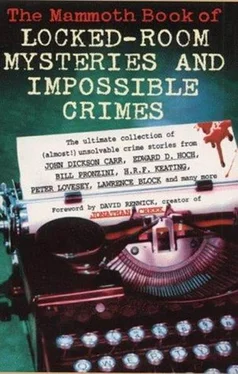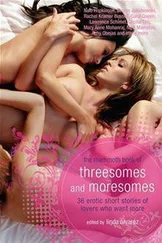Mike Ashley - The Mammoth Book of Locked-Room Mysteries And Impossible Crimes
Здесь есть возможность читать онлайн «Mike Ashley - The Mammoth Book of Locked-Room Mysteries And Impossible Crimes» весь текст электронной книги совершенно бесплатно (целиком полную версию без сокращений). В некоторых случаях можно слушать аудио, скачать через торрент в формате fb2 и присутствует краткое содержание. Жанр: Детектив, на английском языке. Описание произведения, (предисловие) а так же отзывы посетителей доступны на портале библиотеки ЛибКат.
- Название:The Mammoth Book of Locked-Room Mysteries And Impossible Crimes
- Автор:
- Жанр:
- Год:неизвестен
- ISBN:нет данных
- Рейтинг книги:3 / 5. Голосов: 1
-
Избранное:Добавить в избранное
- Отзывы:
-
Ваша оценка:
- 60
- 1
- 2
- 3
- 4
- 5
The Mammoth Book of Locked-Room Mysteries And Impossible Crimes: краткое содержание, описание и аннотация
Предлагаем к чтению аннотацию, описание, краткое содержание или предисловие (зависит от того, что написал сам автор книги «The Mammoth Book of Locked-Room Mysteries And Impossible Crimes»). Если вы не нашли необходимую информацию о книге — напишите в комментариях, мы постараемся отыскать её.
A new anthology of twenty-nine short stories features an array of baffling locked-room mysteries by Michael Collins, Bill Pronzini, Susanna Gregory, H. R. F. Keating, Peter Lovesey, Kate Ellis, and Lawrence Block, among others.
The Mammoth Book of Locked-Room Mysteries And Impossible Crimes — читать онлайн бесплатно полную книгу (весь текст) целиком
Ниже представлен текст книги, разбитый по страницам. Система сохранения места последней прочитанной страницы, позволяет с удобством читать онлайн бесплатно книгу «The Mammoth Book of Locked-Room Mysteries And Impossible Crimes», без необходимости каждый раз заново искать на чём Вы остановились. Поставьте закладку, и сможете в любой момент перейти на страницу, на которой закончили чтение.
Интервал:
Закладка:
“That’s good,” I said. “My store faces south, and the building across the street blocks some of the sunlight, but a little gets through. I have to make sure I don’t keep any of the better volumes where the light can get at them.”
“You should paint the windows black,” he said, “or hang thick curtains. Or both.”
“Well, I like to keep an eye on the street,” I said. “And my cat likes to sleep in the sunlit window.”
He made a face. “A cat? In a room full of books?”
“He’d be safe,” I said, “even in a room full of rocking chairs. He’s a Manx. And he’s an honest working cat. I used to have mice damaging the books, and that stopped the day he moved in.”
“No mice can get in here,” Bellermann said, “and neither can cats, with their hair and their odour. Mould cannot attack my books, or mildew. You feel the air?”
“The air?”
“A constant sixty-four degrees Fahrenheit,” he said. “On the cool side, but perfect for my books. I put on a jacket and I am perfectly comfortable. And, as you can see, most of them are already wearing their jackets. Dust jackets! Ha ha!”
“Ha ha,” I agreed.
“The humidity is sixty per cent,” he went on. “It never varies. Too dry and the glue dries out. Too damp and the pages rot. Neither can happen here.”
“That’s reassuring.”
“I would say so. The air is filtered regularly, with not only air conditioning but special filters to remove pollutants that are truly microscopic. No book could ask for a safer or more comfortable environment.”
I sniffed the air. It was cool, and neither too moist nor too dry, and as immaculate as modern science could make it. My nose wrinkled, and I picked up a whiff of something.
“What about fire?” I wondered.
“Steel walls, steel doors, triple-glazed windows with heat-resistant bulletproof glass. Special insulation in the walls and ceiling and floor. The whole house could burn to the ground, Bernie, and this room and its contents would remain unaffected. It is one enormous fire-safe.”
“But if the fire broke out in here…”
“How? I don’t smoke, or play with matches. There are no cupboards holding piles of oily rags, no bales of mouldering hay to burst into spontaneous combustion.”
“No, but-”
“And even if there were a fire,” he said, “it would be extinguished almost before it had begun.” He gestured and I looked up and saw round metal gadgets spotted here and there in the walls and ceiling.
I said, “A sprinkler system? Somebody tried to sell me one at the store once and I threw him out on his ear. Fire’s rough on books, but water’s sheer disaster. And those things are like smoke alarms, they can go off for no good reason, and then where are you? Karl, I can’t believe-”
“Please,” he said, holding up a hand. “Do you take me for an idiot?”
“No, but-”
“Do you honestly think I would use water to forestall fire? Credit me with a little sense, my friend.”
“I do, but-”
“There will be no fire here, and no flood, either. A book in my library will be, ah, what is the expression? Snug as a slug in a rug.”
“A bug,” I said.
“I beg your pardon?”
“A bug in a rug,” I said. “I think that’s the expression.”
His response was a shrug, the sort you’d get, I suppose, from a slug in a rug. “But we have no time for language lessons,” he said. “From two to six I must be in the library with my books, and it is already one-fifty.”
“You’re already in the library.”
“Alone,” he said. “With only my books for company. So. What have you brought me?”
I opened my briefcase, withdrew the padded mailer, reached into that like Little Jack Horner and brought forth a plum indeed. I looked up in time to catch an unguarded glimpse of Bellermann’s face, and it was a study. How often do you get to see a man salivate less than an hour after a big lunch?
He extended his hands and I placed the book in them. “ Fer-de-Lance ,” he said reverently. “Nero Wolfe’s debut, the rarest and most desirable book in the entire canon. Hardly the best of the novels, I wouldn’t say. It took Stout several books fully to refine the character of Wolfe and to hone the narrative edge of Archie Goodwin. But the brilliance was present from the beginning, and the book is a prize.”
He turned the volume over in his hands, inspected the dust jacket fore and aft. “Of course I own a copy,” he said. “A first edition in dust wrapper. This dust wrapper is nicer than the one I have.”
“It’s pretty cherry,” I said.
“Pristine,” he allowed, “or very nearly so. Mine has a couple of chips and an unfortunate tear mended quite expertly with tape. This does look virtually perfect.”
“Yes.”
“But the jacket’s the least of it, is it not? This is a special copy.”
“It is.”
He opened it, and his large hands could not have been gentler had he been repotting orchids. He found the title page and read, “ ‘For Franklin Roosevelt, with the earnest hope of a brighter tomorrow. Best regards from Rex Todhunter Stout.’” He ran his forefinger over the inscription. “It’s Stout’s writing,” he announced. “He didn’t inscribe many books, but I have enough signed copies to know his hand. And this is the ultimate association copy, isn’t it?”
“You could say that.”
“I just did. Stout was a liberal Democrat, ultimately a World Federalist. FDR, like the present incumbent, was a great fan of detective stories. It always seems to be the Democratic presidents who relish a good mystery. Eisenhower preferred Westerns, Nixon liked history and biography, and I don’t know that Reagan read at all.”
He sighed and closed the book. “Mr Gulbenkian must regret the loss of this copy,” he said.
“I suppose he must.”
“A year ago,” he said, “when I learned he’d been burglarized and some of his best volumes stolen, I wondered what sort of burglar could possibly know what books to take. And of course I thought of you.”
I didn’t say anything.
“Tell me your price again, Bernie. Refresh my memory.”
I named a figure.
“It’s high,” he said.
“The book’s unique,” I pointed out.
“I know that. I know, too, that I can never show it off. I cannot tell anyone I have it. You and I alone will know that it is in my possession.”
“It’ll be our little secret, Karl.”
“Our little secret. I can’t even insure it. At least Gulbenkian was insured, eh? But he can never replace the book. Why didn’t you sell it back to him?”
“I might,” I said, “if you decide you don’t want it.”
“But of course I want it!” He might have said more but a glance at his watch reminded him of the time. “Two o’clock,” he said, motioning me toward the door. “Eva will have my afternoon coffee ready. And you will excuse me, I am sure, while I spend the afternoon with my books, including this latest specimen.”
“Be careful with it,” I said.
“Bernie! I’m not going to read it. I have plenty of reading copies, should I care to renew my acquaintance with Fer-de-Lance. I want to hold it, to be with it. And then at six o’clock we will conclude our business, and I will give you a dinner every bit as good as the lunch you just had. And then you can return to the city.”
He ushered me out, and moments later he disappeared into the library again, carrying a tray with coffee in one of those silver pots they used to give you on trains. There was a cup on the tray as well, and a sugar bowl and creamer, along with a plate of shortbread cookies. I stood in the hall and watched the library door swing shut, heard the lock turn and the bolt slide home. Then I turned, and there was Karl’s wife, Eva.
Читать дальшеИнтервал:
Закладка:
Похожие книги на «The Mammoth Book of Locked-Room Mysteries And Impossible Crimes»
Представляем Вашему вниманию похожие книги на «The Mammoth Book of Locked-Room Mysteries And Impossible Crimes» списком для выбора. Мы отобрали схожую по названию и смыслу литературу в надежде предоставить читателям больше вариантов отыскать новые, интересные, ещё непрочитанные произведения.
Обсуждение, отзывы о книге «The Mammoth Book of Locked-Room Mysteries And Impossible Crimes» и просто собственные мнения читателей. Оставьте ваши комментарии, напишите, что Вы думаете о произведении, его смысле или главных героях. Укажите что конкретно понравилось, а что нет, и почему Вы так считаете.










